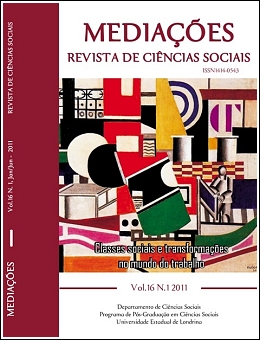Mundo material: o mito da economia imaterial
DOI:
https://doi.org/10.5433/2176-6665.2011v16n1p24Palabras clave:
Economia imaterial, Globalização, Trabalhador do conhecimento, Produtividade, CapitalismoResumen
Uma nova ortodoxia está se constituindo, que toma como certo que o "conhecimento" é a única fonte de valor, que o trabalho é uma eventualidade e não é localizável, que a globalização é um processo inexorável e inevitável e que, por, consequência, a resistência é vã e qualquer reivindicação advinda de um corpo físico aqui-e-agora está irremediavelmente fora de moda. As implicações deste "senso comum" são imensas, pois podem moldar assuntos tão diversos quanto impostos, legislação trabalhista, níveis de gastos com previdência, direitos de privacidade, e política ambiental. São noções que servem para legitimar uma nova agenda política e estabelecer o cenário para uma nova fase da acumulação de capital. A tarefa que me coloquei neste ensaio é re-corporificar/re-encarnar o espaço cibernético para tentar tornar visíveis os componentes materiais deste mundo virtual.Descargas
Citas
BELL, Daniel. The coming of post-industrial society. New York: Basic Books, 1973.
BHASKAR, Roy. A realist theory of science. London: Verso Books, 1997a.
BHASKAR, Roy Dialetic: the pulse of freedom. London: Verso Books, 1997b.
BRAVERMAN, Harry. O labor and monopoly capital: the degradation of work in the twentieth century. New York: Monthly Review Press, 1974.
CAIRNCROSS, Frances. The death of distance: how the communications revolution will change our lives. Boston: Havard Business School Press, 1997.
COLLIER, Andrew. Critical review: an introduction to Ray Bhaska's philosophy. London: Verso Books, 1994.
COYLE, Diane. Weightless world: strategies for managing the digital economy. Oxford: Capstone Publishing, 1997.
COYLE, Diane. Why knowledge is the new engine of economic growth. The Independent, London, 1998.
ESPING-ANDERSEN, Gøsta. The three world of welfare capitalism. Cambridge: Policy Press, 1990.
FERNIE, Sue; METCALF, David. Hanging on the phone.Centerpiece: The Magazine of Economic Performance, London, v. 3, n. 1, 1998.
HARAWAY, Donna J. Simians, cyborgs and women: the reinvention of nature. London: Routledge, 1991.
HIRST, Paul; THOMPSON, Grahame. Globalization in question. Oxford: Policy Press, 1996.
HOLDERNESS, Mike. The internet: enabling whom? when? and where? In: INTERNATIONAL WORKSHOP ON THE INFORMATION REVOLUTION AND ECONOMIC AND SOCIAL EXCLUSION IN THE DEVELOPING COUNTRIES, 1996, Maastricht. Papers… Maastricht, 1996.
HUWS, Ursula. Beyond Anedoctes: on quantifying the globalization of information. In: CONFERENCE GLOBALIZED INFORMATION SOCIETY: Employment implications, 1996, Maastricht. Proceedings… Maastricht: United Nations University Institute for New Technologies, 1996a.
HUWS, Ursula. Changes in the west London economy. London: West London Training and Enterprise Council, 1992.
HUWS, Ursula. Consuming fashions. New Statements and Society. Berg, aug. 1998.
HUWS, Ursula. Follow-up to the white paper-telemarketing. European Commission Directorate General V, sept. 1994.
HUWS, Ursula. Teleworking: an overview of the research. London: Analytica, 1996b.
HUWS, Ursula. The making of a cybertariat: virtual work in a real world. London: The Merlin Press, 2003.
HUWS, Ursula. What is a green-red economics: the futuro of work. Z Magazine, Boston, set. 1991.
INCOME data: pay and conditions in call center. IDS Report, London, n. 739, jun. 1997.
JACKSON, Tim. Material concerns: pollution, profit and quality of life. London: Routledge, 1996.
LEE, Clive H. British regional employment statistics: 1841-1971. Cambridge: Cambridge University Press, 1979.
MADRICK, Jeff. Computers: waiting for the revolution, The New York Review of Books, 26 mar. 1998.
MCLOUGHLIN, Una. Call center staff development. T, p. 18-21, oct. 1997.
MEYER, Christopher; DAVIS, Stan. Blur: the speed of change in the connected economy. South Port: Addison-Wesley, 1998.
NANDA, Meera. Restoring the real: rethinking social constructivist theories of science. Socialist Register, New York, v. 33, 1997.
NEEF, Dale (ed.). The economic impact of knowledge: resource for the knowledgebased economy. Boston: Butterworth-Heinemann, 1998.
NEUBURGER, Henry. Measuring economic activity. [S.l.: s.n.], 1999a. Artigo não publicado
NEUBURGER, H. Modifying PIB. . [S.l.: s.n.], 1999b. Artigo não publicado.
NEUBURGER, H. Thoughts on the productive paradox. . [S.l.: s.n.], 1999c. Artigo não publicado.
NOBLE, David. Digital diploma Mills. New York: Monthly Review Press, 2002.
NORTON, Bob; SMITH, Cathy. Understanding the virtual organization. Hauppage: Barrons Educational, 1998.
QUAH, Danny. As productive as a french farmer. Asian Wall Street Journal, 29 sept. 1997.
QUAH, Danny. Increasingly weightless economies. Bank of England Quarterly Bulletin, fev. 1997.
QUAH, Danny. Policies for the weightless economy. Londres: Social Market Foundation, 1998. Lecture.
REARDON, G. Externalysing information-processing work: breaking the logic of spatial and work organization. In: CONFERENCE GLOBALIZED INFORMATION SOCIETY: Employment Implications, 1996, Maastricht. Proceeding... Maastricht: University Institute for New Technologies, 1996.
SHAW, Martin; MILES, Ian. The social roots of statistical knowledge. In: IRVINE, John; MILES, Ian; EVANS, Jeff. Demystifying social statistics. London: Pluto Press, 1981. p. 27-38.
SOETE, Luc. The cahllenges of innovation. IPTS Report 7: Institute for Prospective Technological Studies, Sevilha, p. 7-13, sept. 1996.
SOETE, Luc; KAMP, Karin. The "BIT TAX": the case for further research. MERIT, Maastricht: Universidade de Maastricht, aug. 1996.
TAPSCOTT, Don (ed.). Blueprint for the digital economy: wealth creation in the era of e-business. New York: McGraw Hill, 1998.
TAPSCOTT, Don. The digital economy: promise and peril in the age of networked intelligence. New York: McGraw Hill, 1995.
THERE is no finish line: running shoes. News from Irene, n. 22, p. 33-36, mar. 1995.
Descargas
Publicado
Cómo citar
Número
Sección
Licencia
Derechos de autor 2011 Ursula Huws

Esta obra está bajo una licencia internacional Creative Commons Atribución 4.0.
Los derechos de autor de los artículos publicados en Mediations son del autor; En caso de republicación parcial o total de la primera publicación, se solicita a los autores que indiquen la publicación original en la revista.
Mediações utiliza la licencia Creative Commons Attribution 4.0 International, que proporciona acceso abierto, permitiendo a cualquier usuario leer, descargar, copiar y difundir su contenido, siempre que esté debidamente referenciado.
Las opiniones emitidas por los autores de los artículos son de su exclusiva responsabilidad.
































